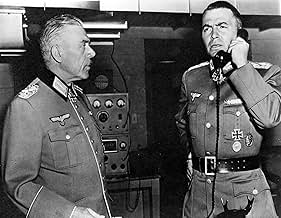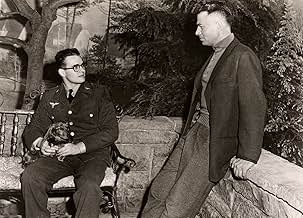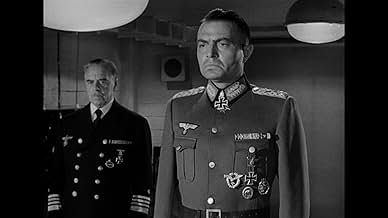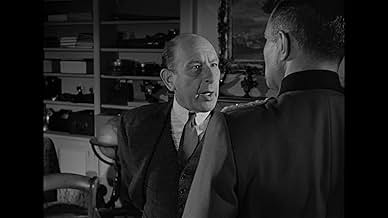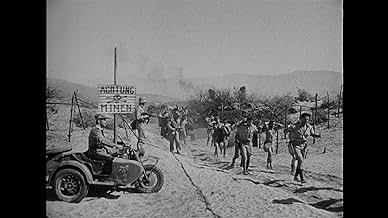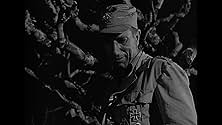IMDb RATING
6.9/10
7.1K
YOUR RATING
The story of the final years of the respected World War II German general, Erwin Rommel.The story of the final years of the respected World War II German general, Erwin Rommel.The story of the final years of the respected World War II German general, Erwin Rommel.
- Director
- Writers
- Stars
- Awards
- 1 win total
Philip Ahlm
- German Soldier & Chauffeur
- (uncredited)
John Alderson
- German Sergeant
- (uncredited)
- …
Jack Baston
- Gen. Alfred Jodl
- (uncredited)
Robert Bohannon
- Minor Role
- (uncredited)
Boyd Cabeen
- Minor Role
- (uncredited)
Roland Carpenter
- German Officer
- (uncredited)
Mary Carroll
- Rommel's Maid
- (uncredited)
Steve Carruthers
- Signal Man
- (uncredited)
- Director
- Writers
- All cast & crew
- Production, box office & more at IMDbPro
6.97K
1
2
3
4
5
6
7
8
9
10
Featured reviews
Possibly Germany's Best Known Strategist
The story of the final years of the respected World War II German general, Erwin Rommel (James Mason).
I really didn't know much about Rommel going in to this film, and I don't know if I know all that much more coming out of it. Apparently he was British? And he answered to a silly Hitler that seemed liked a caricature of the real thing? I joke, but it is amusing how movies used to make no attempt whatsoever to get people's nationality correct.
Beyond that, the film is actually fairly decent because it operates more or less as a one man show for James Mason. And Mason is a joy to watch (and an even bigger joy to listen to). Not a bad story, either, although I am not sure how openly people were calling Hitler "evil" and trying to overthrow him.
I really didn't know much about Rommel going in to this film, and I don't know if I know all that much more coming out of it. Apparently he was British? And he answered to a silly Hitler that seemed liked a caricature of the real thing? I joke, but it is amusing how movies used to make no attempt whatsoever to get people's nationality correct.
Beyond that, the film is actually fairly decent because it operates more or less as a one man show for James Mason. And Mason is a joy to watch (and an even bigger joy to listen to). Not a bad story, either, although I am not sure how openly people were calling Hitler "evil" and trying to overthrow him.
Desert Fox casting
Although a very well crafted and watchable film that stays close to the historical characters and events, without the usual Hollywood treatment of such period war movies - action heroes, love interest, bangs and explosions etc., however there is some strange castings. Notably Manfred, Rommel's son, who looks like a 1950's geeky American college kid. Jessica Tandy, a much underrated actress is superb. Mason could act the pants of any other actor and shines in this film, as indeed he did playing the same role in The Desert Rats. Richard Boone in a rare non-cowboy role makes me wonder why he never prospered in mainstream cinema. For once Hollywood manages to make a factual film without distorting history in order to get bums on seats and sell popcorn.
Fine Bio, but.....
This is a fine biopic of a worthy and honorable opponent serving a despicable cause. Unfortunately, there is not enough North Africa Campaign in the film to satisfy a war film buff. When I first saw it in the theater, it did whet my appetite to learn more about this horrendous and costly war. I have been interested in it since. The acting is first-rate, and, unlike Enemy at the Gate, the British and American accents don't detract from the film, the British accents at any rate. As others have noted in their reviews of this film, Rommel probably wasn't anti-semitic. He deliberately ignored Hitler's orders to round up Jews during the invasion of France. He also never forgave Hitler for abandoning the Afrika Korps to their fate in 1942, not to Hitler's less than energetic attempts to keep the DAK supplied.
history's mysteries
Wonderful performances, first-rate script and direction (moving musical score in key places, as well), plus a well-structured theme about moral dilemmas of patriotic soldiers who realize they're obeying evil orders, make this a little-known gem.
Did Rommel really participate in the plot to kill Hitler? Hitler sure thought so. He had his favorite general poisoned; about that there is no question.
Did Rommel know Hitler before the war? Not sure when they became acquainted but Rommel ran AH's bodyguard unit for a while, then became one of Hitler's favorite generals when he helped sweep the British to Dunkirk in 1940.
Was Rommel aware of and morally responsible for the Holocaust? A recent award winning Rommel biography cites one scene I wish they could have included in this film: Rommel around 1941 advised Hitler that he was concerned by Allied carping on German anti-semitism. "Why don't we put some Jews into prominent leadership positions and shut them up?" Rommel suggested. Hitler told Rommel to stick to military matters and, after the general exited the room, told associates: "That fellow has absolutely no understanding of what we are trying to accomplish."
The movie does generally succeed in portraying the theme of a soldier so single-mindedly focused on the professional technique of his job that he only slowly awakens to the moral horror and self-destructiveness of the leader he serves.
The Churchill quote used at the film's ending is meant to address (and answer) the questions about whether it is morally proper to make a film that glorifies a Nazi general. If Churchill could say such magnanimous things about him...and it's an accurate quote...then so could Hollywood.
(Interesting historical note: British film audiences in the early 1950s were not in such a generous mood. The studio quickly churned out the much-inferior "Desert Rats" film, featuring Mason as a more-villainous Rommel, to mollify outraged critics.)
Where did the quote come from that is spoken in this film by von Reunstadt: "Victory has a thousand fathers, but defeat is an orphan"? Yes, JFK used it, famously, after the Bay of Pigs fiasco. Many newsmen of the time mistakenly credited the president with originating it, but JFK didn't claim credit for it. The line has since been traced back to some Italian count in the 1500s. His name was Ciano or something like that. But JFK was a big movie fan and, my guess is, probably learned this aphorism from "The Desert Fox" a decade before using it in his famous post-Bay of Pigs press conference!
Did Rommel really participate in the plot to kill Hitler? Hitler sure thought so. He had his favorite general poisoned; about that there is no question.
Did Rommel know Hitler before the war? Not sure when they became acquainted but Rommel ran AH's bodyguard unit for a while, then became one of Hitler's favorite generals when he helped sweep the British to Dunkirk in 1940.
Was Rommel aware of and morally responsible for the Holocaust? A recent award winning Rommel biography cites one scene I wish they could have included in this film: Rommel around 1941 advised Hitler that he was concerned by Allied carping on German anti-semitism. "Why don't we put some Jews into prominent leadership positions and shut them up?" Rommel suggested. Hitler told Rommel to stick to military matters and, after the general exited the room, told associates: "That fellow has absolutely no understanding of what we are trying to accomplish."
The movie does generally succeed in portraying the theme of a soldier so single-mindedly focused on the professional technique of his job that he only slowly awakens to the moral horror and self-destructiveness of the leader he serves.
The Churchill quote used at the film's ending is meant to address (and answer) the questions about whether it is morally proper to make a film that glorifies a Nazi general. If Churchill could say such magnanimous things about him...and it's an accurate quote...then so could Hollywood.
(Interesting historical note: British film audiences in the early 1950s were not in such a generous mood. The studio quickly churned out the much-inferior "Desert Rats" film, featuring Mason as a more-villainous Rommel, to mollify outraged critics.)
Where did the quote come from that is spoken in this film by von Reunstadt: "Victory has a thousand fathers, but defeat is an orphan"? Yes, JFK used it, famously, after the Bay of Pigs fiasco. Many newsmen of the time mistakenly credited the president with originating it, but JFK didn't claim credit for it. The line has since been traced back to some Italian count in the 1500s. His name was Ciano or something like that. But JFK was a big movie fan and, my guess is, probably learned this aphorism from "The Desert Fox" a decade before using it in his famous post-Bay of Pigs press conference!
"This Is The Thanks I Get?"
For meritorious service above and beyond the call of duty to his country, Rommel was advised in the end to 'off' himself. No trial necessary, as he was guilty until proved innocent, and why waste everyone's time. But, of course, he was working for the original 'wild and crazy guy'.
"The Desert Fox" is an excellent biopic and is an idealized version of Rommel's military career, particularly as it pertains to Germany's WW II Afrika Corps. It is one of James Mason's best pictures, right behind "Odd Man Out" and slightly ahead of "A Star Is Born". It is a sympathetic portrayal of a man torn between loyalty and love of country, and perhaps a man a little slow on the uptake regarding current internal military affairs. Supporting acting was in very capable hands and there was chemistry evident between Mason and his wife, played by Jessica Tandy. Good script, good direction - hard to find a flaw in this one, which played on FMC the other morning.
"The Desert Fox" is an excellent biopic and is an idealized version of Rommel's military career, particularly as it pertains to Germany's WW II Afrika Corps. It is one of James Mason's best pictures, right behind "Odd Man Out" and slightly ahead of "A Star Is Born". It is a sympathetic portrayal of a man torn between loyalty and love of country, and perhaps a man a little slow on the uptake regarding current internal military affairs. Supporting acting was in very capable hands and there was chemistry evident between Mason and his wife, played by Jessica Tandy. Good script, good direction - hard to find a flaw in this one, which played on FMC the other morning.
Did you know
- TriviaErwin Rommel's widow, Lucie Marie Rommel acted as a technical consultant and adviser to this movie. She was played by Jessica Tandy in the film itself. Mrs. Rommel lent the production some of her husband's personal artifacts and liaised with Nunnally Johnson, the film's producer and screenwriter. As Frau Lucie Maria Rommel, Mrs Rommel later also acted as a military consultant to the film The Longest Day (1962) made by 20th Century-Fox, the same studio that produced this movie.
- GoofsThe opening commando raid shows at least a dozen German soldiers killed. In reality, only four were killed.
- Quotes
Field Marshal Gerd von Runstedt: [It's] too late for me. I'm seventy now - too old to fight, too old to challenge authority, however evil... but not too old, however, to wish you and your friends the best of luck in their extremely interesting enterprise.
- Crazy creditsThe 20th Century Fox logo appears without the usual fanfare.
- ConnectionsEdited from Desert Victory (1943)
- SoundtracksThe Army Air Corps Song
(uncredited)
Music by Robert Crawford
Heard during the scenes of D-Day and the ensuing battles
Details
- Runtime
- 1h 28m(88 min)
- Color
- Aspect ratio
- 1.37 : 1
Contribute to this page
Suggest an edit or add missing content


